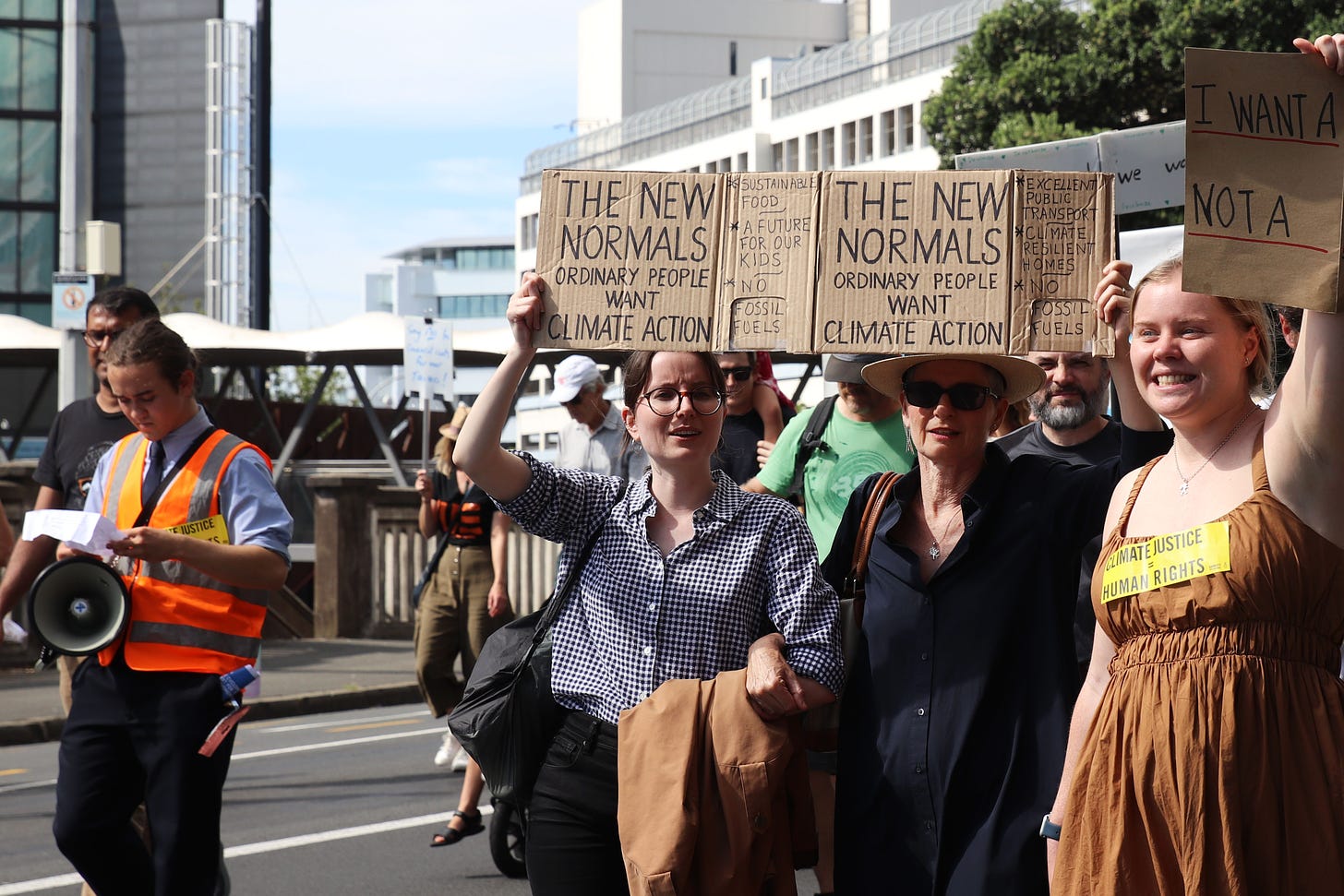
TL;DR: Here’s the top five news items of note in climate news for Aotearoa-NZ this week, and a discussion above between Bernard Hickey and The Kākā’s climate correspondent Cathrine Dyer
The Government is systematically dismantling environmental and climate policy architecture, while claiming that targets are safe. This is not credible and suggests a plan to ‘fail quietly’.
Submissions for the Fast-Track Approvals bill close at the end of this week. According to national treasure Dame Anne Salmond, the bill represents a “naked grab for power” and “a shift toward authoritarian governance by ministerial fiat”.
Once ecosystems are destroyed, they are gone forever in what is known as ‘the humpty dumpty’ effect. Professor Margaret Stanley gives five reasons why the bill threatens already fragile ecosystems and explains what we stand to lose from the bill in The Conversation
The Climate Change Commission released three big draft reports this week. Newsroom’s Marc Daalder helps to make it all digestible with these five key takeaways.
El Nino conditions have come to an end, according to the Australian Bureau of Meteorology. All eyes are on what happens next after March’s all-time record global surface temperature of 1.68˚C above the pre-industrial average shocked scientists. Will temperatures revert back to the norm, or will we be forced to accept an acceleration in climate change has taken place?
(See more detail and analysis below, and in the video and podcast above. Cathrine Dyer’s journalism on climate and the environment is available free to all paying and non-paying subscribers to The Kākā and the public. It is made possible by subscribers signing up to the paid tier to ensure this sort of public interest journalism is fully available in public to read, listen to and share. Cathrine wrote the wrap. Bernard edited it. Lynn copy-edited and illustrated it.)
Dismantling on the quiet
The Government’s claim that it will achieve the country’s 2030 climate targets, without buying additional international offsets and while it systematically dismantles climate policy architecture, is not credible.
It appears the Government is planning to fail quietly, believing that its own voters don’t care, and that the issue lacks salience among all voters at election time, in the midst of other real and created crises. Research has shown policymakers rarely wish to make plain or visible their desire to dismantle environmental policy, least of all to the young.
LinkedIn post from the Minister for Climate Change Simon Watts, in response to young climate protesters.
Rather than using traditional democratic and legislative processes to establish new approaches to environmental management, the current government is devising workarounds, that functionally destroy existing policy architecture without, or prior, to officially dismantling it. The public submissions process offers, at best, a passing nod toward democracy. If anything, it is a way to channel those who loudly disagree toward a void they can shout into, from which no echo will ever escape.
Submissions on the Fast-track Approvals Bill close at the end of this week. If you want yours to be read, publish it on social media and make your views explicit. Among the many reasons to be concerned about the Bill, two commenters from the academic world have made particularly strong cases highlighting its dangers.
Dame Anne Salmond warns that the bill is a
“a naked power grab – an assault on democratic checks and balances in New Zealand, and a shift towards authoritarian governance by ministerial fiat.”
The list of projects that will be fed into this process will not be available for public scrutiny until after the select committee has completed its deliberations. This reduces the possibility that large swathes of the population will come to understand, before it is too late, that their welfare, their way of life, and the places that are important to them, may be sacrificed in the name of ‘economic development’ that largely benefits an economic elite. By veiling the specifics, the government is reducing the visibility of their dismantling project. According to Salmond, the three Ministers with ultimate power over future projects
“are setting themselves up as judge, jury and executioner, despite their limited personal expertise and knowledge of the relevant legal and technical issues.[...] Nor are there rigorous protections against conflicts of interest including campaign donations, hospitality and lobbying, despite a lack of transparency about ministerial decision-making. The potential for pork barrel politics and corrupted decision-making is obvious.”
Can’t put it back together again ..
To make clear what is at risk, Professor Margaret Stanley penned this excellent summary for the Conversation, highlighting five reasons why the Fast-track Approvals Bill threatens New Zealand’s already fragile ecosystems by emphasising short-term economic gain.
“Ecosystems cannot be restored. Once destroyed, they are gone forever. This is known in restoration ecology as the “Humpty Dumpty effect.” Here are just some of the facts:
· only 22% of Aotearoa’s original vegetation remains
· at least 79 species extinctions have been recorded
· remaining species currently threatened or at risk include 94% of reptiles, 90% of seabirds, 74% of land birds, 76% of freshwater fish and 46% of plants
· 90% of our wetlands have been lost, as well as 80% of our active sand dune ecosystems
· 63% of rare ecosystems are threatened
· 46% of lakes over one hectare are in poor or very poor ecological health.”
New Zealand has been designated one of 25 global biodiversity “hot spots” for conservation priority because so many of our endangered native species are not found anywhere else on the planet. Stanley also emphasises how the environment underpins the economy, health and culture, contributing an estimated NZ$57 billion(27% of GDP) to human welfare in 2012 alone. Although this can only be a substantial underestimate, given the limitations inherent in attempting to valorise that which is priceless. Nevertheless, mounting losses will increasingly undermine the welfare of people and society in Aotearoa going forward.
Digestible takeaways from three draft reports
Last week, the Climate Change Commission released three major draft reports. The first considers whether New Zealand’s 2050 net zero and methane emissions targets should be changed, the second looks at whether to include international aviation and shipping emissions in domestic targets, while the third proposes targets for the next five-year carbon budget. Journalist Marc Daalder makes it all digestible, offering five key takeaways from the reports, including:
1) Climate change is getting worse faster than expected and we should consider strengthening the targets for 2050.
2) The country has made more progress toward our current climate goals than expected. It should be noted that three key drivers of this were more rapid uptake of electric vehicles than expected (the government has since cancelled the clean car discount), reductions that stemmed from the previous governments subsidies for decarbonising industry (the GIDI fund, which has since been cancelled in favour of tax cuts) and a spike in pine tree planting (the current government intends to limit farm to forestry conversions). These mean that the country is now on-track to achieve net zero long-lived emissions by 2042, although methane emissions are still not on track against 2050 targets.
3) There are net social and economic benefits to acting ambitiously on climate change compared to business-as-usual, particularly in the transport sector. (It should be noted that the draft Government Policy Statement (GPS) on land transport, released in early March, has earned the ire of experts for its backward steps on climate).
4) It is possible to achieve net-zero emissions in the 2030s under the commission’s demonstration pathway.
5) International shipping and aviation should be included in targets, to enable the country to better do its share toward the global target.
The Climate Change Commission is consulting with the public on its draft advice until the end of the May, with the final report due to be delivered to the government at the end of the year.
“Crucially, the commission didn’t think there has been any “important or notable change in the understanding of the physical science of methane” that would necessitate watering down the methane targets. It specifically stated it had “found no evidence to support weakening the current 2050 target” even as the Government has launched a separate review of the methane target with an eye to weakening it.
The arrival in overseas markets of new methane-inhibiting technology for livestock and new understandings of the risks to carbon stored in forests also gave reason for potentially strengthening the target, the commission said.”
Much of what has been working to reduce greenhouse gases in Aotearoa has now been cancelled by the new Government including the GIDI fund, cycling and walking initiatives, the clean car discount, funding of rail, and the commitment to 100% renewable energy. New commitments that work in opposition to climate change mitigation include the intention to restart oil and gas exploration, commitment to a massive road building programme, and another delay to agriculture’s entry into the ETS. No credible pathway to achieving the 2030 targets has been offered.
On Page 28 of the Climate Change Commission’s draft advice on the fourth emissions budget, lurks a comment that may shed some light on one fudge that the government may be planning to apply to 2030 targets:
“For this draft advice, we are not proposing any changes to the current accounting rules. However, the Government has indicated it plans to make two changes in its approach to measuring and reporting emissions, which may impact emissions budgets:
· The Government has said it intends to make changes that will allow emissions and removals from pre-1990 forest management activities to be included when calculating Aotearoa New Zealand’s emissions.
· It has started work to include new, additional sources of emissions and removals, which are not counted under current accounting rules.
Without careful consideration, these changes could make it possible to achieve set emissions budgets without meaningfully reducing gross emissions. This would impact how effectively these budgets can help Aotearoa New Zealand step down its emissions in line with achieving the 2050 target and contributing to global efforts to limit warming to 1.5°C above pre-industrial levels.”
The gap between the country’s erstwhile climate ambitions and the means to achieving them have been growing at a steady pace, alongside periodical assurances that the targets are safe.
Governments are required under Net Zero legislation to respond to the Climate Change Commissions advice, but they are not required to take that advice. In assembling a new ‘independent panel’ to consider methane emissions targets, the Government is signalling its willingness to ignore the existing independent panel (that the public is already paying for), in favour of finding an alternative ‘independent panel’ that will likely be comprised of experts whose advice it prefers. This is yet another workaround that effectively dismantles the architecture of environmental policy, while pretending to endorse it.
The quiet dismantling of environmental protections, whilst claiming to be delivering on them is bullshit of a particularly dangerous kind because it undermines the welfare of the collective, while serving the short-term economic interests of a few. There is no rule that requires the media or the public to give the government the benefit of the doubt for this amount of time when the facts simply don’t stack up and the stakes are so high. Humpty Dumpty is sliding off the wall.
Adiós El Niño
In other news, El Niño conditions have reached an end. The Australian Bureau of Meteorology says waters have cooled substantially over the past week. That announcement is seasoned with uncertainty about what will happen next, according to Matt McGrath at the BBC.
“A string of recent global monthly high temperature records has led some scientists to fear that the world could be tipping into a new phase of even faster climate change.
Scientists say that the months after the end of El Niño will give a strong indication as to whether the recent high temperatures are due to accelerated climate change or not.”
March 2024 had the hottest temperatures on record - +1.68˚C warmer than the pre-industrial average according to the EU’s Copernicus Climate Change service. Whether or not temperatures revert to something more aligned with the expectations of consensus climate science will be revealed over the next few months.
“The critical question is what happens next and on this scientists are divided.
US researchers recently said there was 60% chance of a La Niña developing between June-August, and an 85% chance of this happening by Autumn.
But the Australian Bureau say such statements such be treated with caution. They expect neutral conditions to last until at least July. “
A La Niña would have a stronger cooling effect but would also herald a more active hurricane season in the Atlantic.
Sources referenced:
Paterson, M., Wilshire, S., & Tobin, P. (2023). The Rise of Anti-Net Zero Populism in the UK: Comparing Rhetorical Strategies for Climate Policy Dismantling. Journal of Comparative Policy Analysis: Research and Practice, 1–19. https://doi.org/10.1080/13876988.2023.2242799
Stevenson, H. (2021). Reforming global climate governance in an age of bullshit. Globalizations, 18(1), 86-102. https://doi.org/10.1080/14747731.2020.1774315
Ka kite ano
Bernard and Cathrine
PS: After this was written, the epic Potsdam Institute paper estimating the economic damage from climate change was published in Nature.
Cathrine and I did an emergency one-off podcast and article on that here to ensure it was covered in a timely fashion.

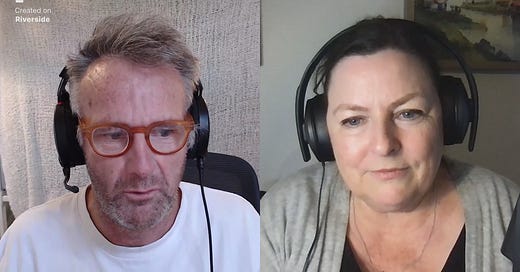



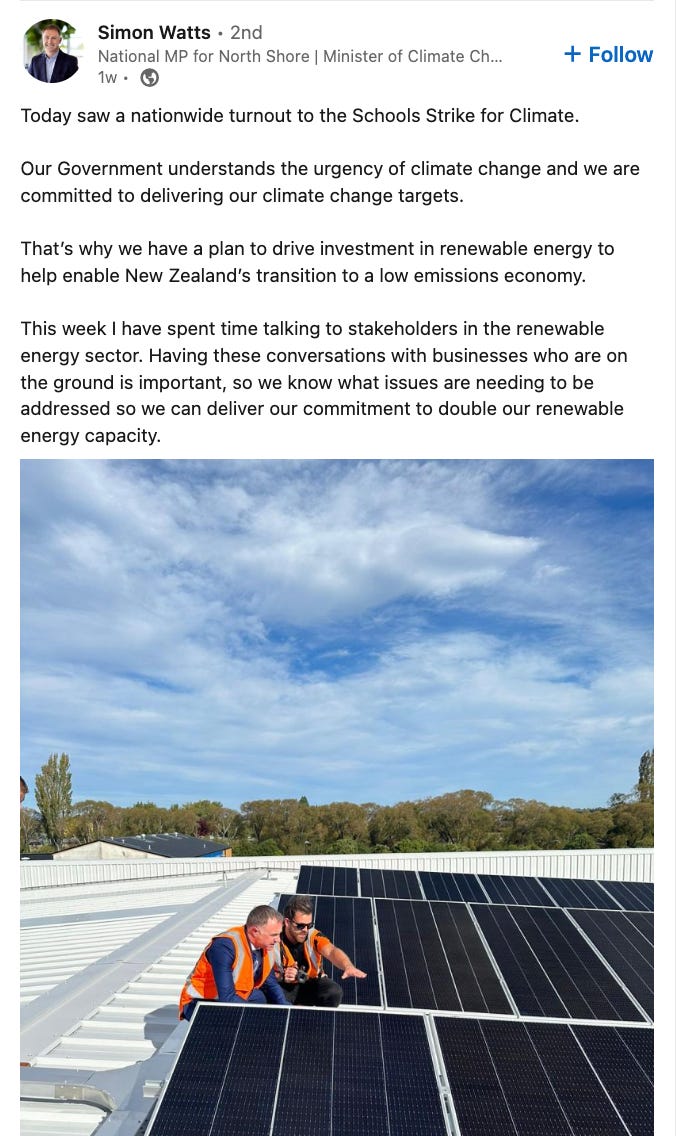
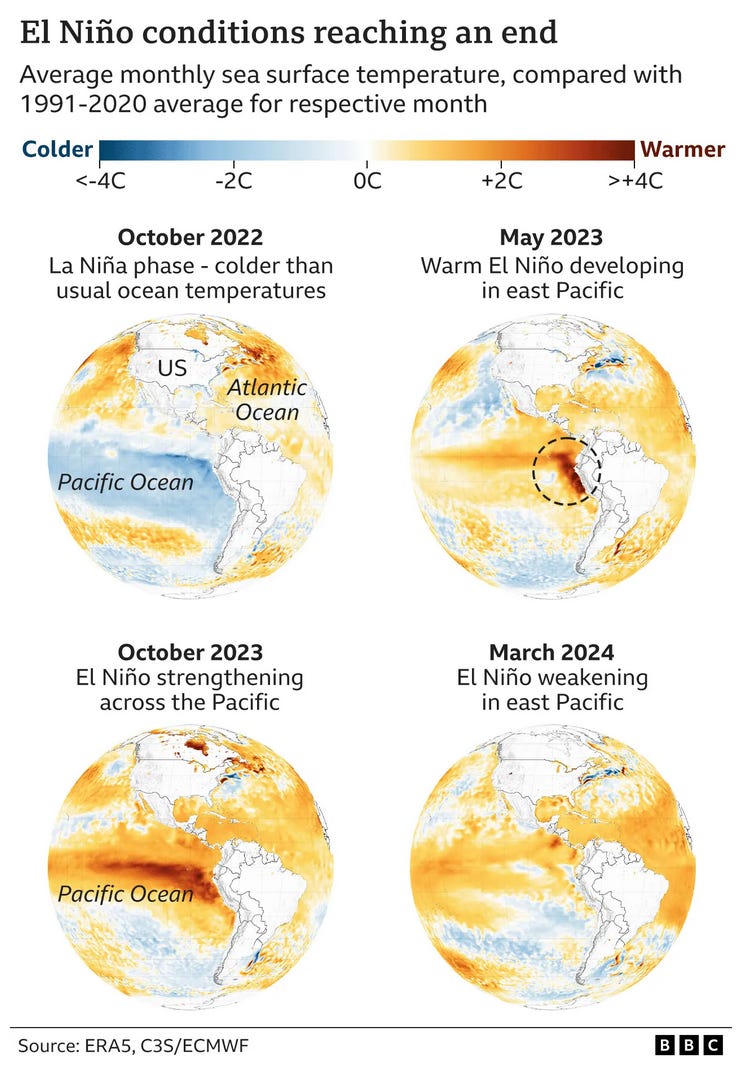
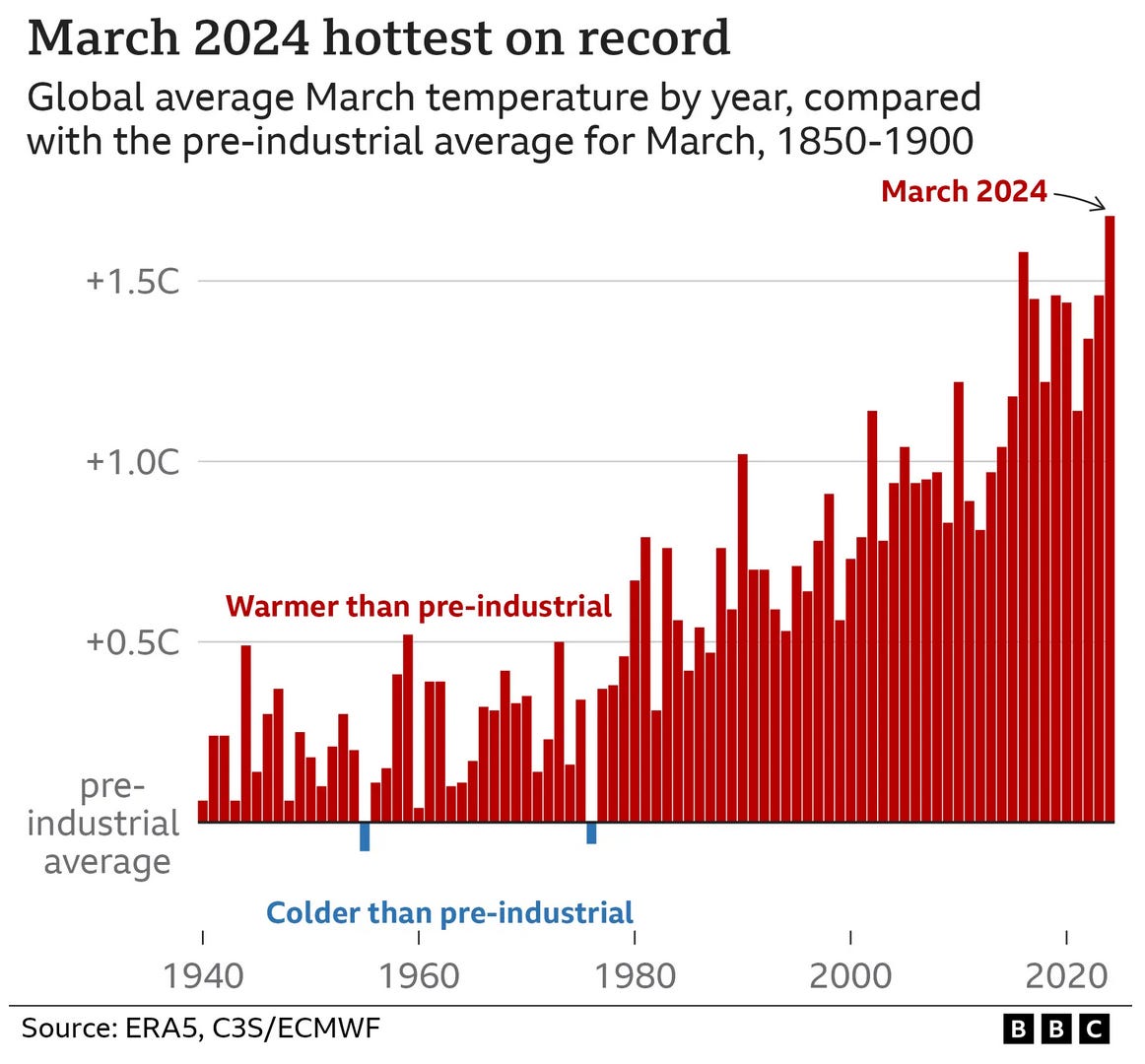










Share this post